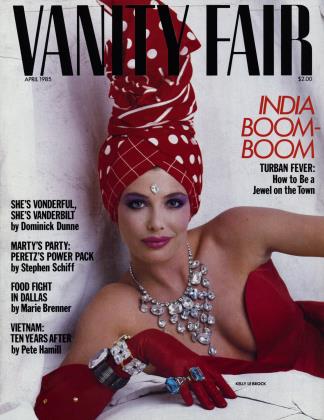Sign In to Your Account
Subscribers have complete access to the archive.
Sign In Not a Subscriber?Join NowFinal Fling
BOOKS
James Wolcott
Then we die, will Mickey and Minnie Mouse be there to welcome us at the gates of Heaven, waving their little white gloves? Is death the Disneyland of the Hereafter, a series of spires rising from cotton-candy clouds? Stanley Elkin's new novel, The Magic Kingdom (E. P. Dutton), is a guided tour of death's dominion, with Pluto and Goofy on hand to pass out balloons to the kiddies. It's a sick-humor excursion, this book, a crash course in coping. Eddy Bale, the English impresario of The Magic Kingdom, is a man whose son was whittled away to nothing by a rare terminal disease—a disease that made Bale "the U.K.'s most visible, most recognizable beggar." Grief-racked, Bale begins to think that, instead of baring his soul sores to the press in order to raise money for his son's expensive treatments, he should have shown the lad a bit of fun. "We should have hijacked the sweet shoppe and turned him loose at the fair," he tells the Queen of England. So Bale cooks up the ultimate scheme for turning kids loose at the fair: chaperoning a group of terminally ill children on a trip to Disney World, in Orlando, Florida. Like his son, these kids have bodies that have become damaged baggage. One girl is swollen pregnant with a tumor. Another suffers from a bum heart, which has turned her skin a skyish blue. (Little birds fly across her for practice, claims a teasing child.) And one poor eight-year-old, prematurely aged, is so senile he "can't tell you whether it's Tuesday morning or 1066." Eddy Bale is flying to the Magic Kingdom with a crate of broken eggs.
Stanley Elkin himself is partially disabled (from multiple sclerosis), and he writes about the freak infirmities of his characters with confederate zest. He doesn't pat them on the head and go "There, there," but robes himself in their sick flesh and makes each child's fate tragically unique. He inhabits their spoiled cocoons. If the prematurely aged Charles Mudd-Gaddis is his most amusing creation ("He's a wise old nipper," thinks Eddy Bale. "Like whoosis, Sam Jaffe, in Lost Horizon"), the wingless bluebird, Janet Order, is his most magical. As if in tribute to his admirer William Gass, the author of On Being Blue, Elkin sails into blue rapture when he enters Janet's fancies.
The fact was that blue, quite apart from the cyanotics of her illness, was her favorite color. And hadn't she, in the ocean depths and sky heights of those blue dreams, at the balls and celebrations, the coronations, inaugurals, and masques, all the dress-blue ceremonials...
Whew! Take a breath, Stanley, before the rest of us turn blue. When Elkin is in trademark form, looping his sentences like a lariat and figure-eighting the air, he seems capable of entertaining himself forever. And as with any great solo exhibitionist, he soon draws a crowd. We gather round to watch his intricate hand-jive.
But a writer can become so entranced with his audience-pleasing tricks that he loses track of the story, and I'm afraid that's what happens to Stanley Elkin in this novel. The Magic Kingdom is a half-enthralling, half-great book. One early chapter, in which Elkin zips in and out of the dreams of his dying children (little blue Janet Order becomes a sea sprite, nuzzled by seals), is as brilliant and moving as anything in recent fiction. It's a reminder of how intimate an art fiction is, how deeply it swims into the coral recesses where myth and memory and desire are buried. Once Elkin gets his ailing troupe to Disney World, however, he's got to find a dramatic payoff for the contrast between the cruelly betraying, failing bodies of his characters and the ever spruce, ever smiling shine of Walt Disney's cartoon critters. And I'm afraid that the payoff is blabby and forced. Like so many works of black absurdism (including some of Elkin's own books, such as The Dick Gibson Show), The Magic Kingdom collapses into hysteria and human sacrifice; it becomes so wacky and untamed that it knocks itself silly. But there's no denying the rhetorical pow of the book's final pages, in which Elkin re-enters the blighted womb to incubate a new sickling and pays caustic tribute to nature's casualties—"felons of a nightmare blood, fallen pediatric angels. . .God's ugly, punished customers."
And there's also no mistaking whom Stanley Elkin considers the head Mouseketeer of his Magic Kingdom—and ours. " 'That's right,' Mudd-Gaddis said, and shuffled off, Nedra Carp [his nanny] looking after the little withered fellow in a sort of awe. Death was the authority here. Death was boss." And behind its painted grin, Death is not smiling.
 View Full Issue
View Full Issue


















Subscribers have complete access to the archive.
Sign In Not a Subscriber?Join Now